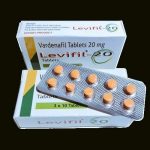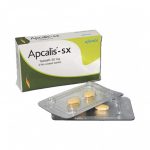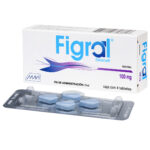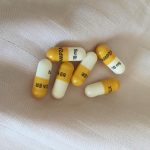Degra: Uses, Dosage, Side Effects, Interactions, Warnings
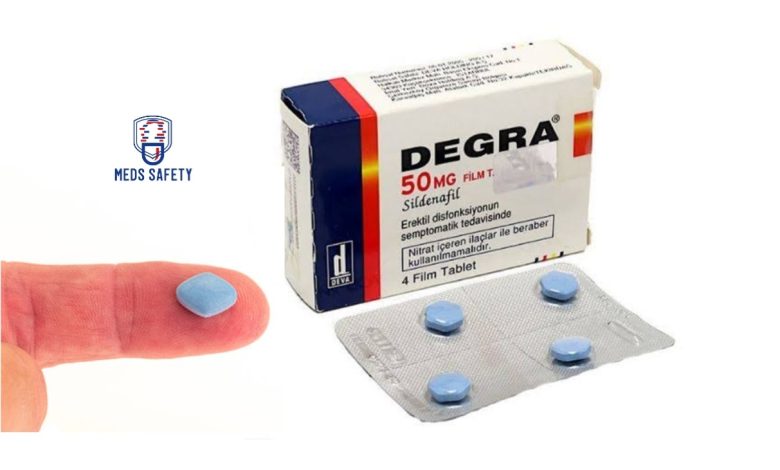
Degra is a brand name for a medication that contains sildenafil, which is the same active ingredient found in Viagra. Sildenafil is a well-known and widely used medication for the treatment of erectile dysfunction (ED). ED is a common condition that affects a significant number of men, particularly as they age. It is characterized by the inability to achieve or maintain an erection sufficient for sexual activity.
ED can have various causes, including physical, psychological, and lifestyle factors, and it is a condition that can be challenging for many individuals to discuss openly. It can have a significant impact on one’s self-esteem, relationships, and overall quality of life. However, thanks to medications like Degra, which contains sildenafil, many men with ED have found effective treatment options that allow them to regain their sexual function and confidence.
The main ingredient in Degra is sildenafil citrate. The inactive ingredients include:
- anhydrous dibasic calcium phosphate
- artificial colors
- croscarmellose sodium
- hypromellose
- lactose
- magnesium stearate
- microcrystalline cellulose
- titanium dioxide
- triacetin
How Degra works
Degra falls into a class of medications called phosphodiesterase type 5 (PDE5) inhibitors. These inhibit phosphodiesterase enzymes, which degrade the molecules that relax the muscle tissue. This allows for increased blood flow, causing an erection. Degra is fast-acting, and its effects typically last about 1 hour. However, Degra does not instantaneously produce an erection, and sexual arousal is necessary for the drug to work.
If you are taking Degra to treat erectile dysfunction, you should know that it does not cure erectile dysfunction or increase sexual desire. Degra does not prevent pregnancy or the spread of sexually transmitted diseases such as human immunodeficiency virus (HIV). People are more likely to experience adverse reactions to the drug if they take more than the recommended amount.
Degra Dosage
The typical dosage for Degra is as follows:
- Recommended Dosage: For most patients, the recommended starting dose is 50 mg taken as needed, approximately 1 hour before sexual activity. This dose can be adjusted based on individual response and tolerance.
- Timing: Degra, like other sildenafil medications, can be taken anywhere from 30 minutes to 4 hours before engaging in sexual activity. The flexibility in timing allows individuals to plan for intimacy without a strict time constraint.
- Maximum Frequency: It is important to note that the maximum recommended dosing frequency for Degra or any medication containing sildenafil is once per day. Taking more than one dose within a 24-hour period is not safe and can increase the risk of side effects.
- Individual Variations: It’s essential to recognize that the appropriate dosage can vary from person to person. Some individuals may find that a 50 mg dose is effective, while others may require a higher dose (e.g., 100 mg) for the desired effect. The initial dose should be determined by a healthcare professional based on a thorough evaluation of an individual’s medical history and the severity of their ED.
- Response and Tolerance: It’s common for healthcare providers to adjust the dosage based on an individual’s response and tolerance to the medication. A lower dose may be effective for some, while others may need a higher dose to achieve the desired results. Adjustments should always be made in consultation with a healthcare professional.
It’s crucial to follow the prescribed dosage and usage instructions provided by a healthcare provider to ensure the safe and effective use of Degra or any medication containing sildenafil. Additionally, individuals should be aware of potential side effects and interactions with other medications, so open communication with a healthcare professional is essential to address any concerns or questions related to the use of this medication.
What side effects can Degra cause?
Degra may cause side effects. Tell your doctor if any of these symptoms are severe or do not go away:
• headache
• heartburn
• diarrhea
• nausea
• flushing (feeling of warmth)
• nosebleeds
• numbness, burning, or tingling in the arms, hands, feet, or legs
• pain in muscles, back, arms, or legs
• changes in color vision (seeing a blue tinge on objects or having difficulty telling the difference between blue and green)
• sensitivity to light
• nasal congestion
Some side effects can be serious. If you experience any of the following symptoms, call your doctor immediately:
• sudden severe loss of vision (see below for more information)
• blurred vision
• sudden decrease or loss of hearing
• ringing in ears
• dizziness or lightheadedness
• fainting
• chest pain
• worsening shortness of breath
• erection that is painful or lasts longer than 4 hours
• rash; itching; hives; difficulty breathing or swallowing; swelling of the eyes, face, throat, tongue, or lips
Some patients experienced a sudden loss of some or all of their vision after they took sildenafil or other medications that are similar to sildenafil. The vision loss was permanent in some cases. It is not known if the vision loss was caused by the medication. If you experience a sudden loss of vision while you are taking Degra, call your doctor immediately. Do not take any more doses of Degra or similar medications such as tadalafil (Cialis) or vardenafil (Levitra) until you talk to your doctor.
There have been reports of heart attack, stroke, irregular heartbeat, bleeding in the brain or lungs, high blood pressure, and sudden death in men who took Degra for erectile dysfunction. Most, but not all, of these people had heart problems before taking Degra. It is not known whether these events were caused by Degra, sexual activity, heart disease, or a combination of these and other causes. Talk to your doctor about the risks of taking Degra.
Some patients experienced a sudden decrease or loss of hearing after they took Degra or other medications that are similar to Degra. It is not known if the hearing loss was caused by the medication. If you experience a sudden loss of hearing, sometimes with ringing in the ears or dizziness, while you are taking Degra, call your doctor immediately. If you are taking Degra for erectile dysfunction, do not take any more doses of Degra or similar medications such as tadalafil (Cialis) or vardenafil (Levitra) until you talk to your doctor. If you are taking Degra (Liqrev, Revatio) for PAH, do not stop taking your medication until you talk to your doctor.
Degra may cause other side effects. Call your doctor if you have any unusual problems while you are taking this medication.
Interactions
Degra can interact with a range of other medications, potentially causing adverse effects or altering the effectiveness of the drug. It’s crucial to be aware of these potential interactions and consult with a healthcare provider before taking Degra. Here are some important drug interactions to be mindful of:
1. Similar Medications for Erectile Dysfunction: Degra should not be taken with other medications used to treat erectile dysfunction, such as avanafil (Stendra), tadalafil (Cialis), or vardenafil (Levitra). Combining these drugs can increase the risk of side effects and complications.
2. Pulmonary Arterial Hypertension Medications: If you are taking medications for pulmonary arterial hypertension, like riociguat (Adempas), you should avoid using Degra. The combination of these drugs can lead to dangerously low blood pressure.
3. Nitrate Medications: Do not take sildenafil if you are using nitrate-based medications for chest pain or heart problems. Nitrates include drugs like nitroglycerin, isosorbide dinitrate, and isosorbide mononitrate. These are often used for angina. Combining sildenafil with nitrates can cause a sudden and severe drop in blood pressure, which can be life-threatening.
4. Medications for High Blood Pressure or Prostate Disorders: Inform your doctor if you are taking drugs to treat high blood pressure or a prostate disorder. Some medications in these categories may interact with sildenafil.
5. Antifungal Medicines: Medications like ketoconazole or itraconazole, which are used to treat fungal infections, can interact with sildenafil. These interactions may affect the metabolism of sildenafil in the body.
6. HIV/AIDS Medications: If you are taking medicines to treat HIV/AIDS, especially ritonavir and others, inform your healthcare provider. These medications can interact with sildenafil and affect its effectiveness.
It’s important to note that this list of potential drug interactions is not exhaustive. There may be other medications, both prescription and over-the-counter, as well as vitamins and herbal products, that can interact with sildenafil. To ensure your safety and the efficacy of your treatment, it’s essential to discuss all the medications and supplements you are taking with your healthcare provider. They can provide guidance on the appropriate use of Degra and help you avoid potentially dangerous interactions.

